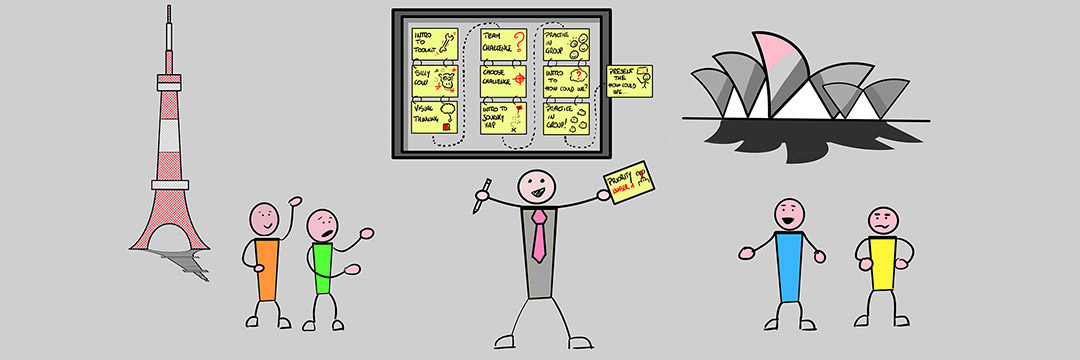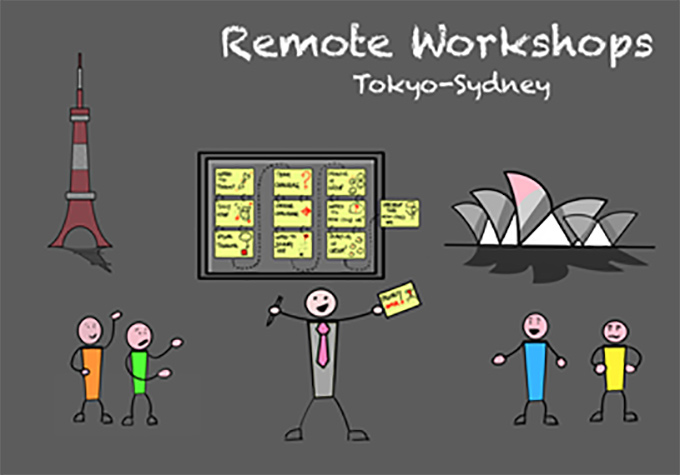Remote workshop sessions
2020.3.25
Remote workshop sessions are a real possibility. Is MSF ready to take it?
Background
In MSF we fly a lot. That travel is expensive and environmentally harmful. In 2018 MSF reported spending € 52.5M on global travel expenses, a 16% increase from 2016. At the MSF Japan Innovation Unit (JIU) we think can reduce travel related to collaborative workshop sessions. If Coldplay can do it for the environment, why can’t we?
For both organisational/systems design and neonatal medical innovation – two of our four specialisations at the JIU – we facilitate many workshops. Most recently, we ran in-person sessions for colleagues in fundraising, for the South East and East Asia Project, and for the Digital Innovation Group at MSF Australia. To reduce travel, we previously tried using webcams and whiteboards to run sessions: it was extremely painful... But we are a stubborn bunch, and we continue trying with other tools. We recently did far better with a programme called Stormboard.
How did we use stormboard?
We arranged and facilitated a workshop linked to our work on a new device for resuscitating babies in the field. The session had five participants in Tokyo – including members from our third-party developer, Japan BioDesign, and two people from our team – and three in Sydney – including two medical advisors. Our objective was to confirm details about the users of the device, the context in which it would ultimately be used, and challenges facing our proposed solution.

Stormboard allowed us all to use and share digital whiteboards. The possible activities on the whiteboards are very simple, like adding Post-its of different colours and size. Thanks to that simplicity, we did not need to learn too much to use the programme confidently. We then used Skype video conference to get audio from participants in Sydney.
Reflection on our experience
How did we prepare?
Since we were not all physically together, it was more important than usual for the workshop to follow a clear linear process. We had to prepare that process very carefully. We also shared a schedule with participants that was more detailed than usual.
How did we execute the session?
We split the management of the workshop between a facilitator and an assistant. The facilitator focused only on asking questions and reframing insights from participants, while the assistant exclusively managed Stormboard to keep track of what was said. By restricting access, the whiteboards stayed well-controlled, clean and easily comprehensible. The whiteboards were shared only on screen, so everyone both in the room and remotely were looking at the same information.
All participants were aware about the topic, which made the workshop more fluid. We did not need to revisit previous outputs or decisions. In our experience, such reviews are even more disruptive in remotely facilitated sessions.
We had very few technical difficulties; however, we had participants in only two locations. If we had had people in three or more places joining, it may have been technically more cumbersom
What could be improved?
We did not plan for a debriefing session with participants. Scheduling 15 minutes at the end of the entire session to provide review key point is more important in remotely facilitated sessions because there is no opportunity to follow up during coffee breaks or after sessions.
We should also prepare our detailed schedules according to each time zone to avoid simple misunderstandings.
Takeaways
Overall, we found Stormboard a viable alternative to meeting in-person. Our session covered a lot in under 3 hours. This is shorter than many in-person workshops.
The tool is extremely simple, although we had to facilitate a little differently. It was more important than usual to prepare and execute each session so that it progresses clearly, logically, and linearly. Remote workshops have more opportunities for misunderstanding, so organisers must do more to make proceedings easy to follow.
Facilitators cannot work alone. The assistant’s role is crucial for properly capturing and documenting all points covered.
Facilitators and assistants must also be comfortable with Stormboard. Asking people to wait while you figure out how to do something is even more disruptive in remotely facilitated workshops.
As only the assistant could edit Stormboard’s digital whiteboard, we did not waste time teaching participants how to use the tool. That was fine for a one-off session; however, it could be a constraint for more complex projects in which others need to be able to edit shared outputs more directly
Next steps:
- Test other remote workshop facilitation tools. Next up: MURAL
- Test Stormboard for other types of facilitation.
Contact
MSF Japan Innovation Team
MSF Japan Innovation Team is providing innovative ideas of solutions to the MSF activities. If you, either as a company or as a professional, have an idea that would be beneficial to our projects as well as patients, please contact us. Your innovative proposal is always appreciated.
-
E-Mailinnovation@tokyo.msf.org
